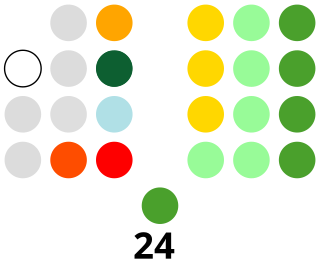Related Research Articles

A member of parliament (MP) is the representative in parliament of the people who live in their electoral district. In many countries with bicameral parliaments, this term refers only to members of the lower house since upper house members often have a different title. The terms congressman/congresswoman or deputy are equivalent terms used in other jurisdictions. The term parliamentarian is also sometimes used for members of parliament, but this may also be used to refer to unelected government officials with specific roles in a parliament and other expert advisers on parliamentary procedure such as the Senate parliamentarian in the United States. The term is also used to the characteristic of performing the duties of a member of a legislature, for example: "The two party leaders often disagreed on issues, but both were excellent parliamentarians and cooperated to get many good things done."

The Senate is the upper house of the bicameral Parliament of Australia, the lower house being the House of Representatives. The composition and powers of the Senate are established in Chapter I of the Constitution of Australia. There are a total of 76 senators: 12 are elected from each of the six Australian states regardless of population and 2 from each of the two autonomous internal Australian territories. Senators are popularly elected under the single transferable vote system of proportional representation.
A member of congress (MOC) is a person who has been appointed or elected and inducted into an official body called a congress, typically to represent a particular constituency in a legislature. The term member of parliament (MP) is an equivalent term within a parliamentary system of government.

The Congress of the Philippines is the legislature of the national government of the Philippines. It is bicameral, composed of a lower body, the House of Representatives, although colloquially the term "Congress" commonly refers to just the latter, and an upper body, the Senate. The House of Representatives meets in the Batasang Pambansa in Quezon City while the Senate meets in the GSIS Building in Pasay.

The Senate of the Philippines is the upper house of Congress of the bicameral legislature of the Philippines with the House of Representatives as the lower house. The Senate is composed of 24 senators who are elected at-large under plurality-at-large voting.

The Parliament of Australia is the legislative branch of the Commonwealth of Australia. It consists of three elements: the monarch, the Senate and the House of Representatives. The combination of two elected chambers, in which the members of the Senate represent the states and territories while the members of the House represent electoral divisions according to population, is modelled on the United States Congress. Through both chambers, however, there is a fused executive, drawn from the Westminster system.

The Senate is the upper house of the Cortes Generales, which along with the Congress of Deputies – the lower chamber – comprises the Parliament of the Kingdom of Spain. The Senate meets in the Palace of the Senate in Madrid.
The 100 seats in the United States Senate are divided into three classes for the purpose of determining which seats will be up for election in any two-year cycle, with only one class being up for election at a time. With senators being elected to fixed terms of six years, the classes allow about a third of the seats to be up for election in any presidential or midterm election year instead of having all 100 be up for election at the same time every six years. The seats are also divided in such a way that any given state's two senators are in different classes so that each seat's term ends in different years. Class 1 and class 2 consist of 33 seats each, while class 3 consists of 34 seats. Elections for class 1 seats are scheduled to take place in 2024, class 2 in 2026, and the elections for class 3 seats in 2028.

The Vermont General Assembly is the legislative body of the state of Vermont, in the United States. The Legislature is formally known as the "General Assembly", but the style of "Legislature" is commonly used, including by the body itself. The General Assembly is a bicameral legislature, consisting of the 150-member Vermont House of Representatives and the 30-member Vermont Senate. Members of the House are elected by single and two-member districts. 68 districts choose one member, and 41 choose two, with the term of service being two years. The Senate includes 30 Senators, elected by seven single-member and nine multi-member districts with two or three members each. It is the only state legislative body in the United States in which a third party has had continuous representation and been consecutively elected alongside Democrats and Republicans.

The Senate is the upper house of the States General, the legislature of the Netherlands. Its 75 members are elected on lists by the members of the twelve States-Provincial and four electoral colleges for the Senate every four years, within three months of the provincial elections. All provinces and colleges have different electoral weight depending on their population.

The Senate of Pakistan or Aiwān-e-Bālā Pākistān, constitutionally the House of the Federation, is the upper house of the bicameral Parliament of Pakistan. As of 2023, It has a maximum membership of 100, of which 92 are elected by the provincial legislatures using single transferable vote. Four represent the Federal Capital and another four are representing former Federally Administered Tribal Areas, until membership expiration in 2024. Members sit for terms lasting six years, with half of the house up for election every three years. Unlike the National Assembly, the Senate is a continuing chamber and hence not subject to dissolution.

The Tennessee Senate is the upper house of the U.S. state of Tennessee's state legislature, which is known formally as the Tennessee General Assembly.

The Senate of Puerto Rico is the upper house of the Legislative Assembly of Puerto Rico, the territorial legislature of Puerto Rico. The Senate, together with the House of Representatives of Puerto Rico, control the legislative branch of the government of Puerto Rico.
An independent, non-partisan politician or non-affiliated politician is a politician not affiliated with any political party or bureaucratic association. There are numerous reasons why someone may stand for office as an independent.

The Senate is the upper house of the bicameral legislative branch of Liberia, and together with the House of Representatives comprises the Legislature of Liberia. Each of the fifteen counties are equally represented by two senators, elected to serve staggered nine-year terms. The Senate meets at the Capitol Building in Monrovia.

The prime minister of Cambodia is the head of government of Cambodia. The prime minister is also the chairman of the Cabinet and leads the executive branch of the Royal Government of Cambodia. The prime minister is a member of parliament, and is appointed by the monarch for a term of five years. Since 1945, 37 individuals have served as prime minister; 33 as official prime ministers, and 4 in acting capacities. The current prime minister since 2023 is Hun Manet.

The United States House of Representatives is the lower chamber of the United States Congress, with the Senate being the upper chamber. Together, they comprise the national bicameral legislature of the United States. The House is charged with the passage of federal legislation, known as bills; those that are also passed by the Senate are sent to the president for signature or veto. The House's exclusive powers include, initiating all revenue bills, the impeachment of federal officers, and electing the president if no candidate receives a majority of votes in the Electoral College.
Expulsion is the most serious form of disciplinary action that can be taken against a Member of Congress. The United States Constitution provides that "Each House [of Congress] may determine the Rules of its proceedings, punish its members for disorderly behavior, and, with the concurrence of two-thirds, expel a member." The processes for expulsion differ somewhat between the House of Representatives and the Senate.

The United States Senate is the upper chamber of the United States Congress. The United States Senate, along with the lower chamber of Congress, the United States House of Representatives, comprise the federal bicameral legislature of the United States. The Senate and House maintain authority under Article One of the U.S. Constitution to pass or defeat federal legislation. The U.S. Senate has exclusive power to confirm U.S. presidential appointments, ratify treaties, exercise advice and consent powers, try cases of impeachment brought by the House, all of which provide a check and balance on the powers of the executive and judicial branches of government.

The 1970 United States elections were held on November 3, and elected the members of the 92nd United States Congress. The election took place during the Vietnam War, in the middle of Republican President Richard Nixon's first term. The Democratic Party defended their control of Congress by retaining its Senate majority and increasing its majority in the House of Representatives.
References
- ↑ "Dems accept Burris into the Senate". politico.com. Archived from the original on 2009-01-14.